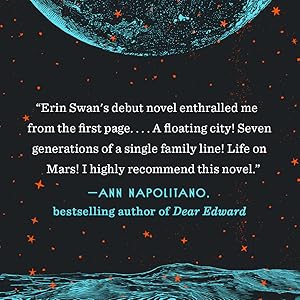![]() Walk the Vanished Earth by Erin Swan
Walk the Vanished Earth by Erin Swan
 Walk the Vanished Earth by Erin Swan is a debut novel with great potential in its underlying premise, structure, and characters, but while the story does at times rise to meet that potential, it does so unevenly and by the end, for me at least, unsatisfactorily.
Walk the Vanished Earth by Erin Swan is a debut novel with great potential in its underlying premise, structure, and characters, but while the story does at times rise to meet that potential, it does so unevenly and by the end, for me at least, unsatisfactorily.
The story opens at the close of a buffalo hunt in the Kansas prairie in 1873, with a young Irishman named Samson doing the last bit of work amidst the bloody carnage and recalling the harsh life that led them here and making plans for the better one he hopes to forge for himself: “In this New World, he told himself, he would be a new man.”
From there, the narrative leaps forward in time to 2073 and outward in space to Mars and a young girl named Moon who has spent much of her remembered life traversing the Marscape with Uncle One and Uncle Two, a pair of beings that are clearly not human. What they are, and how they ended up with Moon in tow, are questions that will eventually be answered, but not for some time.
Before then, Swan moves back and forth not just between these two times and characters, but adds in multiple other characters and time periods, including but not limited to:
- Bea, a pre-teen girl who in 1975 ends up in an institution after showing up in town malnourished, pregnant, non-communicative, disassociative, and clearly traumatized. She’s treated there by Dr James Carson.
- Paul, an orphan living in Kansas City in the 90’s who at age 18 finds out via letter that he is Bea’s son
- Kaiser, a young girl living in 2027 in “the Floating City,” an attempt at a new type of community built by her Pa atop the flooded wreckage of what was once New Orleans.
All these stories and the characters within them are linked, some more immediately clearly than others. Repeated themes run throughout the various segments. The carnage and wastefulness of the bison hunting, which as we know results in their near extinction, is later mirrored by our willful carelessness with regard to our impact on the climate, which also results in disaster(s). Motherhood is another theme closely examined across a spectrum of perspectives.
Meanwhile, individual characterization is a strong point of the novel, with most of the characters richly drawn with all the complexities, for good and ill, of real people. Their interrelationships are less consistently successful, where perhaps the sheer amount of plot and theme Swan is playing with works as a hindrance to more fully realized, more natural relationships. Ones that might have been better served with the advantage of more time spent with them.
That generally is the sense I had of several of the book’s elements. I’m always a sucker for non-linear structure, but while I appreciated what Swan was doing here structurally, the execution fell a bit short, with some of the jumps feeling choppy and the balance being somewhat off. The structure didn’t feel quite honed enough.
The same sense arose with the world-building and the more futuristic plotting, though to a greater degree. I didn’t need hard sci-fi levels of nuts and bolts engineering in terms of how people got to Mars, but I definitely needed more than I got. The same held true for the overall world. I had little sense for instance of what was happening with regard to the various climatic disasters worldwide.
In the end, the book’s flaws outweighed for me its several strengths, though it was a close call. I’m thinking perhaps a more streamlined story might have been of benefit, but one’s mileage may vary.
While Walk the Vanished Earth had its rewards, it didn’t quite hold up, but those rewards were great enough that I’ll be checking out Swan’s next offering.



Do it! One of the best things I've read in recent years.
This reminds me. I want to read Addie LaRue.
We’re in total agreement David!
I felt just the same. The prose and character work was excellent. The larger story was unsatisfying, especially compared to…
Hmmm. I think I'll pass.